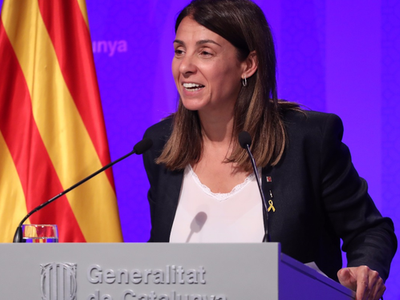- Blockchain technology makes it possible to maintain a permanent, immutable, cyber-secure record of transactions without the need for intermediaries or a central authority

The Catalan government today approved the Blockchain Strategy for Catalonia, which aims to position Catalonia as a leader in the use and development of distributed ledger technologies (DLT).
At a press conference following a meeting of the executive, Minister of the Presidency and government spokesperson Meritxell Budó said: “Catalonia has always been a leader. We played a leading role in previous industrial revolutions, and we want to be at the forefront when it comes to smart technologies and strategies that will facilitate the new approach to governance we want.”
This is why the Catalan government wants to play an active role in fostering emerging technologies such as the Internet of Things (IoT), big data, 5G and blockchain. “Progress, prosperity and the future of work will be closely linked to these technologies. If we’re not actively involved, Catalonia could end up depending on others in these fields,” Budó said.
The government spokesperson pointed out that Barcelona, the capital of Catalonia, is already the world mobile capital and hosts the most important annual congress on the Internet of Things. With the resolution adopted today, the Catalan government, which is also pushing the development of 5G, is laying the foundation to become “actors rather than just onlookers in the advance of blockchain technology”.
Blockchain is a technology that can be used to maintain a permanent, cyber-secure record of transactions without the need for intermediaries or a central authority – a distributed, decentralised, encrypted database that ensures the security of transactions and makes them immutable and transparent.
Its defining features are:
- traceability/transparency, because everything is recorded;
- immutability, because no party can modify the information without the agreement of all the others; and
- security, because a simultaneous attack on the thousands of computers or nodes where information is distributed is inconceivable.
Applying DLT technologies in public administration is a way to increase transparency and ensure public trust while facilitating integration of resilient solutions. These technologies are therefore especially well-suited for managing public services and implementing citizen participation processes.
Moving towards digital administration
Almost a year ago, on 24 July 2018, the Catalan government approved the implementation of blockchain technology in the activity of the public administration. At that time, a working group was set up to consider ways to advance the implementation of blockchain technology in Catalonia. Participants in the working group, which is coordinated by the Ministry for Digital Policy and Public Administration, include various Catalan government ministries and agencies as well as experts in the sector.
The Blockchain Strategy for Catalonia was developed based on the conclusions of this group. The following are some of the projects that are under way now or will be launched in the near future:
- Catalan verified identification system.
- A consent register that will use blockchain technology to facilitate and ensure citizen access to proactive, personalised public services.
- Improvements to waste management to ensure transparency and traceability.
- Support for organ transplantation, with the possibility of sharing data and biological indicators between hospitals to make selection of organ recipients faster and more precise.
- A system that allows patients to authorise a third party to access their medical history for research purposes.
- Support for the energy transition through promotion of photovoltaic self-consumption and by allowing citizens to generate and store their own energy using batteries that can be shared thanks to blockchain technology.
- A secure channel between Parliament and the Government of Catalonia. This project aims to create an internal web service for securely sending and storing messages and trace data between Parliament and the Government of Catalonia.
The Blockchain Strategy for Catalonia encompasses a programme of actions across six key pillars:
- Administration. The Catalan government is committed to pioneering the application of blockchain technologies to improve public services. A testing environment and a blockchain and DLT technology observatory will be set up.
- Promotion. Positioning of Catalonia as a leader in blockchain and DLT technologies. Two particularly significant actions are Blockchain Solutions World (within the framework of the IoT Solutions World Congress) and Barcelona Blockchain Week.
- Innovation. Blockchain and DLT will be boosted through research and technology centres and the development of innovation environments such as the Catalonia Blockchain Living Lab.
- Ecosystem. Measures to boost the new industry and stimulate demand for services and solutions through entrepreneurship programmes and support for the creation of spaces for companies in the sector.
- Talent. Generation, retention and attraction of technological and entrepreneurial talent through training programmes and other measures. Work will be done within the framework of the Barcelona Digital Talent initiative to raise the profile of Barcelona and Catalonia as top destinations for training and employment.
- Regulation. A working group will be set up to analyse existing regulations and define a favourable regulatory framework.